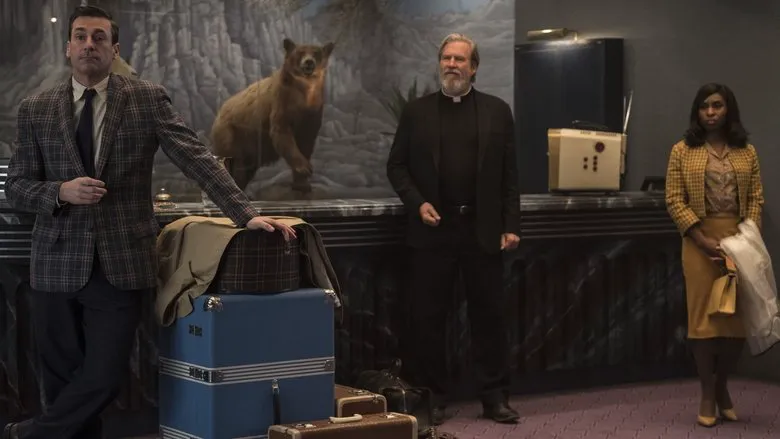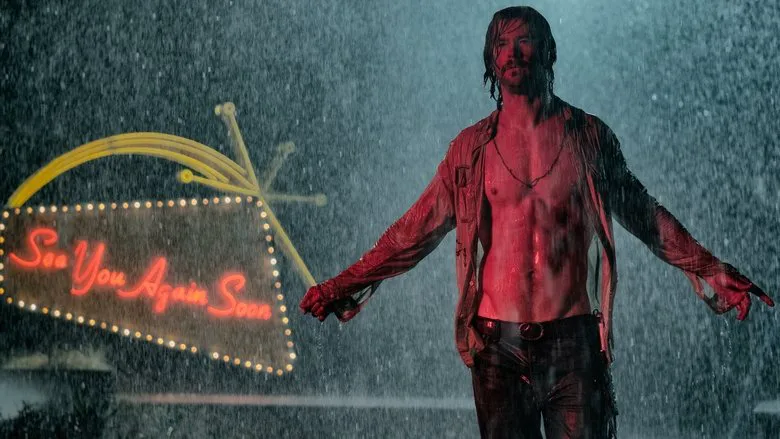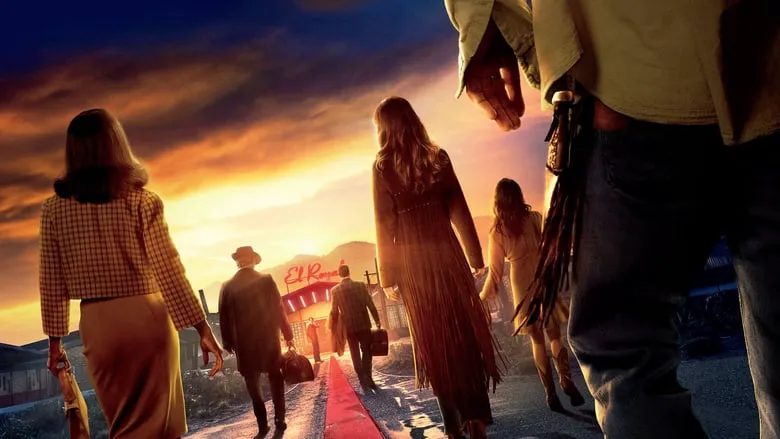An Epic Portrait of an Era, Preserved by Drew Goddard Within the Walls of a Small, Backwater Hotel
A motley crew of characters, each more suspicious than the last, converges at the El Royale, a hotel straddling the California-Nevada state line. There’s a relentlessly chatty vacuum cleaner salesman, a priest with the weathered face of an aging cowboy, and a defiant young woman who keeps everyone at arm’s length. They all harbor secrets, soon to be unleashed in an unrestrained torrent of vibrant violence.
Following his debut with “The Cabin in the Woods,” a sharp-tongued satire of slasher films, Drew Goddard was in no rush to return to directing. He penned scripts for television, adapted “The Martian” for Ridley Scott – anything to avoid helming another feature film. Perhaps Goddard feared failing to surpass his excellent debut, or maybe he simply lacked ideas. Whatever the reason, the important thing is that after seven years, he has finally made his comeback. Mature, witty, and visually striking – if not particularly energetic.

While watching “El Royale,” you’ll inevitably come to terms with an unsettling (though perhaps welcome) realization: this is no “Cabin in the Woods,” and it never tries to be. Drew Goddard isn’t revisiting the same river of deconstruction; instead, he swaps genre satire for social commentary. His El Royale Hotel is akin to the yacht in “Knife in the Water” or the secluded house in Polanski’s “Cul-de-Sac.” It’s an isolated space where not just individuals clash, but entire eras and social strata collide, exposing the underlying ailments of 1960s America in miniature.

It’s no accident that Goddard repeatedly draws the viewer’s attention – sometimes even too insistently – to the fact that his cozy hotel sits on the border between two states. The El Royale is a liminal space in every sense, a purgatory where sins are inevitably brought to light, and only the pure and genuinely repentant can find their way to redemption. Stripped of its social and political undertones, the film becomes a kind of “Divine Comedy” directed by the early Coen brothers or Quentin Tarantino. Goddard shares with the latter a non-linear narrative divided into distinct chapters, and even a similar MacGuffin at the heart of one of the storylines. The result is a symbiosis of “The Hateful Eight” and “Pulp Fiction,” albeit, as one Western critic put it, “lacking an adrenaline shot to the heart.”

A Deliberate Pace
Which, in essence, is true: “Bad Times at the El Royale” is hardly a fast-paced film. Goddard acts as if he has all the time in the world, frequently delving into flashbacks to capture every nuance of character development, savoring key scenes from different perspectives and angles. He meticulously paints an epic portrait of the era with broad strokes, its scope undiminished by the film’s formal intimacy. The result is a kind of “Sixties for Dummies” – a straightforward but skillfully executed snapshot of the era and its archetypal inhabitants, laid bare and vulnerable.

Goddard’s Vision
Drew Goddard deserves praise for his audacity. In an age of constant acceleration, where even trailers have trailers (lest the hyperactive viewer lose focus for a second), few dare to make a two-and-a-half-hour entertainment film unattached to established franchises. There’s a touch of “old Hollywood” about it, a pleasant old-fashionedness, a nostalgia for a time when auteur cinema hadn’t completely retreated into the “indie” realm. It’s a shame that the word “visionary” has acquired a distinctly ironic tinge – it’s a term one is tempted to apply to Drew Goddard. For his handling of space, the connection between form and content, and the striking visual expressiveness – because, above all else, “El Royale” is also a stunningly beautiful film.
A Slightly Fumbled Finish
It’s a pity, however, that Goddard seems to run out of steam towards the end. Apparently, it’s not just the viewer who tires of the lengthy runtime. To borrow the parlance of stand-up comedians, the film’s excellent “setup” is followed by a rather lackluster “punchline” – simple and easily predictable, especially if you remember the “limbic” nature of the hotel. The final bloodbath is swift, with a rather amusing plot twist thrown in, but no ancient gods will emerge from the earth this time. Still, as a character in another film where people mercilessly kill each other in a confined space once said, “Don’t deprive yourself of the pleasure of the process.”